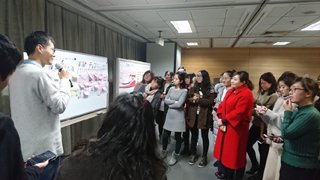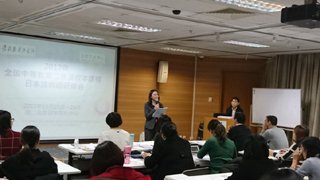2017 Japanese Teacher Training for Chinese Secondary Educational Institutes Nationwide that Have Second Foreign Languages or School-Based Curriculums
The Japan Foundation, Beijing
WANG Chongliang, TAKASAKI Sachiyo, FUJII Mai, URAI Satoshi
The 2017 Japanese teacher training workshop for Chinese secondary education institutes nationwide that have second foreign languages or school-based curriculums*was jointly hosted by The Japan Foundation, Beijing (hereinafter “JFBJ”) and the Japanese language course material research and development center at the Curriculum and Teaching Materials Research Institute (CTMRI), People's Education Press (hereinafter “PEP”), on November 25–26, 2017 at The Japan Foundation, Beijing.
The participants were Japanese-language teachers at secondary educational institutions that offer Japanese-language education as a second foreign language (hereinafter “second language”) or as a school-based curriculum.
The training had the following four goals:
(1) Promote the teaching of Japanese as a second foreign language at secondary schools
(2) Improve the quality of Japanese-language lessons that relate to cross-cultural understanding
(3) Promote the use of “Erin's Challenge! I Can Speak Japanese (Chinese Version)”
(4) Cultivate networks between teachers
25 teachers took part in the training workshop from 11 provinces, cities and autonomous regions across China (Jiangsu Province, Zhejiang Province, Shandong Province, Liaoning Province, Jilin Province, Guangdong Province, Henan Province, Beijing, Tianjin, Shanghai and Inner Mongolia).

A poster presentation by a training workshop participant
Up to now, the JFBJ has been implementing projects for studying Japanese as a second language in Chinese secondary schools while setting three areas as priorities – 1. Enhancing Japanese teaching materials; 2. Syllabus development; and 3. Supporting teachers of Japanese as a second language. Examples include publishing “Erin's Challenge! I Can Speak Japanese (Chinese Version)” in 2013 as the Chinese version of “Erin's Challenge! I Can Speak Japanese;” creating “Erin's Challenge! I Can Speak Japanese (Chinese Version)” (Materials for Schools with Japanese as a Second Language or as a School-based Curriculum); holding an “Erin's Challenge! I Can Speak Japanese (Chinese Version)” familiarization training course in locations throughout China; and holding “The project to support model schools promoting second language learning at secondary level in the three northeastern provinces.” This training workshop incorporated lectures on “Lesson hints for teaching culture” that focused on how to approach culture when teaching Japanese as a second language, as well as practical classroom experience for “Erin's Challenge! I Can Speak Japanese (Chinese Version).” Training course participants formed groups and thought about how to apply the content and lesson activities they had learnt at the course in their own classes, and on the last day of the course these groups created posters and presented them.
The schedule for the training workshop as a whole is as follows:
| Date | Time | Agenda | |
|---|---|---|---|
| November 25 (Saturday) |
Morning | 8:30 a.m. | Reception |
| 8:45–9:00 a.m. | Opening ceremony/photograph | ||
| 9:10–9:40 a.m. | Lecture: “Regarding teaching Japanese as a second language at Chinese secondary educational institutions” | ||
| 9:40–10:40 a.m. | Teacher interaction between participating schools | ||
| 10:50–11:20 a.m. | Introduction to materials: “Erin's Challenge! I Can Speak Japanese (Chinese Version),” “Erin's Challenge! I Can Speak Japanese (Chinese Version)” (Materials for Schools with Japanese as a Second Language or as a School-based Curriculum) | ||
| 11:30–noon | Introduction to materials: “Erin's Challenge! I Can Speak Japanese (Chinese Version),” “Erin's Challenge! I Can Speak Japanese (Chinese Version)” (Materials for Schools with Japanese as a Second Language or as a School-based Curriculum) | ||
| Noon–1:30 p.m. | Lunch | ||
| Afternoon | 1:30–2:50 p.m. | Lecture: “Lesson hints for teaching culture” | |
| 3:00–4:30 p.m. | Workshop: “Considering what constitutes a Japanese as a second language lesson through a practical classroom experience” (1) Practical classroom experience (2) Reflecting on the Japanese lesson |
||
| 4:40–6:00 p.m. | Workshop: “Japanese as a second language lesson for deepening cultural understanding (1)” | ||
| 6:30 p.m. | Get-together | ||
| November 26 (Sunday) |
Morning | 8:30–9:30 a.m. | Workshop: “Japanese as a second language lesson for deepening cultural understanding (2)” |
| 9:40–11:00 a.m. | Group presentations, summing up | ||
| 11:10–11:40 a.m. | Introduction to The Japan Foundation/introduction to teacher training | ||
| 11:40 a.m.–noon | Survey, finishing ceremony, presentation of finishing certificates, summing up | ||
| Noon | Noon– | Lunch/dispersal | |
The schedule for the training workshop was short – effectively a day and a half – but the participants provided the following feedback regarding the course as a whole.
| Really good | Good | Cannot say either way | Not very good | Not good |
|---|---|---|---|---|
| 18 | 7 | 0 | 0 | 0 |
In addition, in the free comments section of the survey participants gave the following feedback (extracts):
- I am really pleased I was able to take part in this training workshop. I was able to listen to lectures by teachers and interact with Japanese-language teachers from around the country. Furthermore, I also came away with various ideas about how to teach “culture.”
- Thank you for letting me take part in the two-day training workshop on the topic of cultural understanding. I genuinely learnt a lot. I was deeply impressed by the lesson design in particular.
- I learnt a great deal, and I think it was really worthwhile to be able to interact with Japanese-language teachers from around the country. If similar opportunities arise in the future by all means allow me to take part.
As the above feedback and comments show, on the whole the degree of satisfaction in the training workshop was high, and we can conclude that the workshop was able to offer a worthwhile experience to the participants. Furthermore, during the workshop the participants displayed tremendous enthusiasm for learning, and this proactive attitude was visible everywhere, including participants who took photos of PowerPoint presentations used in the lectures and asked the speakers questions.

Training workshop opening ceremony
Since 2000, the JFBJ and the PEP have been holding training for Japanese-language teachers at Chinese primary and secondary educational institutions across the country, but this was the first time they had jointly held a Japanese teacher training workshop in this way for Chinese secondary educational institutes nationwide that have second foreign languages or school-based curriculums. They plan to continue holding it in the future. In addition, many of the people who took part in the workshop had not taken part in workshops held by the JFBJ in the past, and a large number of participants were unaware of “Erin's Challenge! I Can Speak Japanese (Chinese Version).” In order to popularize “Erin's Challenge! I Can Speak Japanese (Chinese Version)” as a Japanese teaching material for a second language at secondary educational institutions going forward, conceivably it will be necessary to increase the frequency of these workshops, and to enhance their content also.
* School-based curriculum refers to the course subjects that are decided by schools. Many of them are positioned as elective subjects.
- What We Do Top
- Arts and Cultural Exchange [Culture]
- Japanese-Language Education Overseas [Language]
- Japanese-Language Education Overseas [Language] Top
- Learn Japanese-language
- Teach Japanese-language
- Take Japanese-Language Test
- Know about Japanese-language education abroad
- The Japanese-Language Institute, Urawa
- The Japanese-Language Institute, Kansai
- Japanese-Language Programs for Foreign Specified Skilled Worker Candidates
- Japanese Language Education for Japanese Children Resident Overseas and for the Descendants of Migrants
- Archives
- Japanese Studies and Global Partnerships [Dialogue]
- JF digital collection
- Other Programs / Programs to Commemorate Exchange Year
- Awards and Prizes
- Publications
